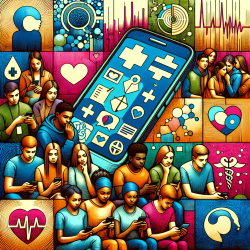Introduction
In the realm of speech-language pathology, data-driven approaches are crucial for creating effective interventions. The study titled "Developing an SMS text message intervention on sexual and reproductive health with adolescents and youth in Peru" offers valuable insights that can be leveraged to enhance practitioner skills, particularly in the context of online therapy services for schools. This blog explores how the outcomes of this research can be applied to improve the delivery of sexual and reproductive health (SRH) education through innovative SMS interventions.
The Study: A Participatory Approach
The research conducted in Peru aimed to develop an SMS platform that provides adolescents and youth with relevant SRH information. The participatory approach involved adolescents, youth, and adult advisers in the creation of SMS content, ensuring that the messages were tailored to the needs and preferences of the target audience. This method not only increased the relevance of the content but also ensured that the language used was accessible and engaging for young people.
Key Findings and Implications for Practitioners
The study revealed several key findings that practitioners can use to enhance their skills and improve outcomes for children:
- Understanding Youth Perspectives: The participatory approach provided insights into what young people know and how they think about SRH topics. Practitioners can use this understanding to tailor their communication strategies and ensure that they are speaking the language of their audience.
- Addressing Knowledge Gaps: The study highlighted misconceptions among adolescents regarding contraceptive methods. Practitioners can focus on providing clear, accurate information to address these gaps and empower young people to make informed decisions.
- Utilizing Mobile Technology: The high penetration of mobile phones among adolescents offers a unique opportunity to deliver SRH education in a private and accessible manner. Practitioners can leverage this technology to reach a wider audience and provide timely information.
Encouraging Further Research
The findings of this study underscore the importance of involving young people in the development of health interventions. Practitioners are encouraged to conduct further research to explore the effectiveness of SMS interventions in different contexts and with diverse populations. By doing so, they can contribute to the growing body of evidence supporting the use of mobile technology in health education.
Conclusion
The study on SMS interventions for SRH education in Peru offers valuable insights that practitioners can apply to improve their skills and create better outcomes for children. By understanding youth perspectives, addressing knowledge gaps, and utilizing mobile technology, practitioners can enhance the delivery of health education and empower young people to make informed decisions.
To read the original research paper, please follow this link: Developing an SMS text message intervention on sexual and reproductive health with adolescents and youth in Peru.










